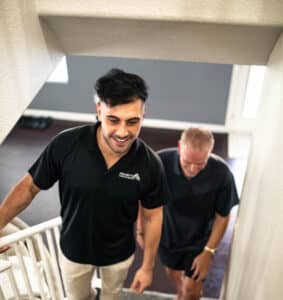Adverse Possession Laws North Carolina
In North Carolina, something interesting is going on with squatters. You see, there’s this legal thing called Adverse Possession, and it basically says that if a squatter stays on a property long enough without being kicked out, they could end up owning it without paying a dime.
But don’t worry, if you’re a property owner in North Carolina, you can protect yourself by knowing the rules.
Understanding the laws around rentals and squatters’ rights in this state is super important. With the right knowledge and planning, you can make sure squatters don’t become a problem on your property.
So, let’s dive into the basics of North Carolina squatters’ rights and how you can keep your property safe.
Is Squatting the Same As Trespassing?

Trespassers: Now, this is a bit more serious. Trespassing is when someone enters another person’s property without permission, often by breaking in. It’s a crime, and if the authorities catch a trespasser in the act, they can get arrested.
Here’s the key difference: Squatting is more of a civil matter, like a disagreement, while trespassing is a criminal offense involving forceful entry. But remember, even squatters can get into trouble or get kicked out if they don’t meet the rules for adverse possession, which is how they claim ownership.
Squatters Rights In North Carolina
So, let’s break down squatter’s rights in North Carolina. In this state, if someone squats on a property and wants to legally claim it as their own, they’ve got to live there continuously for a whopping 20 years! That means no taking off for weeks or months and then coming back to say, “Hey, it’s mine.”
But that’s not all. To make a claim, the squatter must:
- Live There Alone: They can’t have roommates, tenants, or even the actual owner living with them. It’s got to be all theirs.
- Make It Obvious: Everyone, including the property owner, should know they’re living there. No secret squats!
- Treat It Like Their Own: This means taking care of the place, doing repairs, and basically acting like it’s their property.
Now, here’s the tricky part. The squatter has to make a “hostile claim” to the property. “Hostile” can mean a few things:
- Simple Occupation: They didn’t know they were on someone else’s property.
- Awareness of Trespassing: They knew they were squatting and had no legal rights to the place.
- Good Faith Mistake: They thought the property was theirs because of a mistake, like an incorrect deed.
If they meet all these requirements, they can actually become the legal owner of the property. So, if you don’t want this to happen on your property, make sure you have the right legal documents that clearly show who owns it. That way, there’s no room for squatters to claim it as their own.
Do You Need “Color of Title” for Adverse Possession?

Now, here’s the deal: In some states, having “color of title” is a must if you want to claim adverse possession. But North Carolina doesn’t fall into that category. Here, it’s not a requirement. It can make your case stronger, but you can still claim adverse possession without it.
Evicting Squatters
Dealing with squatters on your North Carolina property can be quite a hassle, and it’s important to handle it legally. Here’s a step-by-step guide on how to do it:
- Serve a 10-Days Notice to Quit: Your first move is to serve the squatter with a “Notice to Quit.” This gives them a 10-day window to vacate the property voluntarily before you initiate the eviction process. It’s a formal way of saying, “You need to leave.”
- Legal Action: If the squatter doesn’t budge within those 10 days, you’ll have to take the matter to court. You’ll need to file an eviction lawsuit, and the court will hear your case. If the court decides in your favor, they will issue a “Writ of Possession,” which authorizes the sheriff to physically remove the squatter from your property.
- No Self-Eviction: It’s crucial to know that taking matters into your own hands, like changing locks or cutting off utilities, is illegal. You must go through the proper legal channels.
Protecting Your Property
- Regular Property Inspections: Make it a habit to inspect your property regularly. This way, you can spot any unauthorized occupants early on.
- Secure Entrances: Ensure that all entrances to your property are secure. This includes windows, doors, and gates. The harder it is to get in, the less likely squatters will attempt to occupy it.
- Use Warning Signs: Put up “No Trespassing” signs around your property. These signs act as a deterrent and make it clear that unauthorized entry is not allowed.
- Property Management: Consider hiring an experienced property management company. They can help you with routine inspections, property maintenance, and dealing with potential issues like squatters.
By following these steps, you can protect your property from squatters and, if necessary, handle their removal through the proper legal channels in North Carolina.
Frequently Asked Questions
Can you evict a squatter in NC?
Yes, but it can be complex. You must follow legal steps, including giving notice and possibly going to court. Consulting a lawyer is wise.
What are adverse possession requirements in NC?
Possess for 20 years, pay taxes, show intent to claim, exclusive use, and provide proof, like tax records or witnesses.
How long can you squat in NC?
Up to 90 days, but local laws and zoning matter. After buying, follow state and local rules.
What is a squatter in NC?
Someone living on a property without permission, lease, or ownership. Staying longer than trespassing laws allow is squatting.





